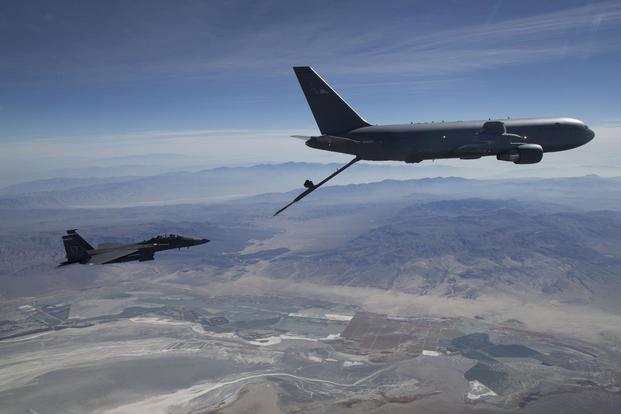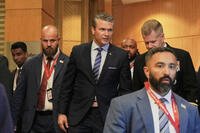The U.S. Air Force has once again halted deliveries of its new KC-46 Pegasus tankers.
Speaking to members of the House Armed Services Committee, Air Force Secretary Heather Wilson revealed the service recently stopped deliveries because more foreign object debris, or FOD, was found in the aircraft.
"The Air Force again halted acceptance of new KC-46 tanker aircraft as we continue to work with Boeing to ensure that every aircraft delivered meets the highest quality and safety standards," spokeswoman Ann Stefanek said in a statement following Wilson's comments.
"This week, our inspectors identified additional foreign object debris and areas where Boeing did not meet quality standards. The issues are unrelated to design or engineering specifications," she said.
Related content:
- Air Force to Keep Close Eye on Boeing as KC-46 Deliveries Resume
- Air Force Halts Delivery of New KC-46 Tankers over Debris Inside Aircraft
- KC-46 Tanker Problems Could Delay Retirement of Older KC-135s
Air Force leaders, including Dr. Will Roper, assistant secretary of the Air Force for acquisition, technology and logistics, have been meeting with Boeing to establish "additional corrective action plans" before the service can again accept aircraft into its inventory, Stefanek said.
The decision to halt acceptance was made March 23, she added.
Roper has called foreign object debris -- trash, tools, nuts and bolts, and other miscellaneous items found scattered inside the aircraft -- "simply unacceptable."
"Debris translates into a safety issue," he said during a House Armed Services Subcommittee on Seapower and Projection Forces hearing March 14.
All aircraft under assembly are supposed to be swept routinely for debris. Loose objects are dangerous because they can cause damage over time.
That same week, Roper told audiences at the McAleese and Associates conference in Washington, D.C., that Boeing needs a culture change at its assembly-line facilities.
"I have big concerns about the FOD issue because that's simply adherence to process," he told reporters after his speech at the conference. "It has nothing to do with design; it has nothing to do with production. It's simply following processes that Boeing has on the books, and having a culture all the way down to the mechanic level that embraces them."
He added, "[The aircraft] should be clean on delivery. If we don't see progress, we'll have to raise the stakes."
In February, the Air Force stopped accepting deliveries of new tankers over FOD problems only weeks after the first aircraft was transported from Boeing's Washington state facility to McConnell Air Force Base, Kansas. The Seattle Times first reported that the debris led to a week-long grounding of the tankers and safety concerns from top service officials. Deliveries resumed March 11.
The continued FOD issue comes as the Air Force grapples with other problems with the aircraft.
The service said in January said it would accept the tanker, based on the 767 airliner, despite the fact it has a number of deficiencies, mainly with its Remote Vision System.
The service currently has seven KC-46As in its inventory.
-- Oriana Pawlyk can be reached at oriana.pawlyk@military.com. Follow her on Twitter at @Oriana0214.













